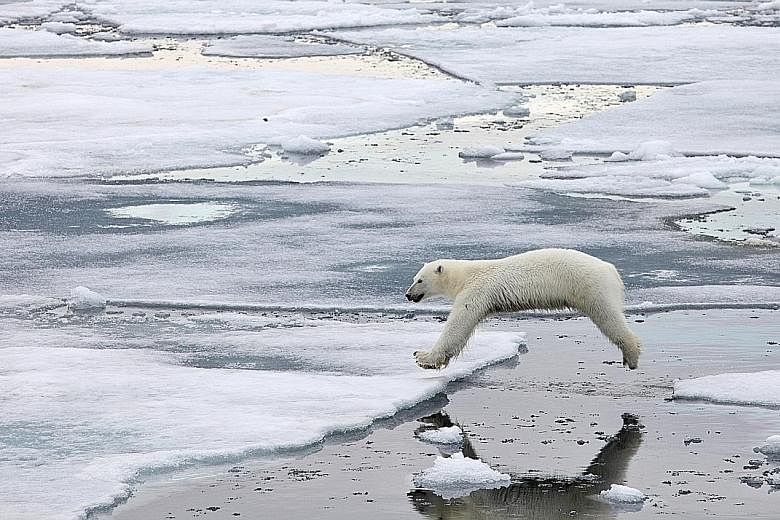Whatever happens in the Arctic - whether melting ice or the possibility of a new trade route - will have a significant impact on Singapore despite how far away it is, said the Minister of State for Foreign Affairs.
Mr Sam Tan told The Straits Times in an e-mail interview ahead of yesterday's opening of a conference on Arctic issues in Tromso, Norway: "Melting polar ice caps pose a threat not just to the surrounding region, but to low-lying islands such as Singapore."
And as a small maritime nation at the crossroads of one of the most important shipping lanes in the world, Singapore is interested in the possibilities that the opening of the Northern Sea Route presents for international shipping, said Mr Tan.
The route is a new passageway for ships in the Arctic region, which is now open for a few months during the northern hemisphere summer. If opened all year round, this passage, which shaves 30 per cent off travel time via the conventional Suez Canal-Malacca Strait option, would have global shipping implications.
But Ms Hema Nadarajah, a Singaporean doctoral candidate studying international relations at the University of British Columbia's department of political science, said the changes bring more opportunities than disruption to the maritime industry in Singapore.
"Keppel Corporation, for example, built its first two icebreakers in 2008 for Russian oil company Lukoil-Kaliningradmorneft," she noted.
"The sea-ice melt, increase in shipping and energy demands in the region offer Singapore opportunities, particularly given its expertise in infrastructure development."
Singapore's interests will be represented at the conference this week, with both Mr Tan and Mr Aziz Merchant, executive director of the marine and deepwater technology division of Keppel Offshore and Marine, speaking at the event.
This year's Arctic Frontiers conference, now in its 13th edition, is themed "Smart Arctic".
The conference director, Mr Ole Ovretveit, said technology could help Arctic nations strike a balance between development and protecting the environment - a dichotomy he foresees getting more pronounced over the next decade in the face of climate change, industrial development and continued exploration for oil and gas.
He cited the "polar paradox", a term used by analysts to describe how global warming and melting ice could boost economic activity such as fossil fuel resource exploration in the Arctic, although these could in turn exacerbate the warming effect.
But it was important to recognise that the Arctic is home to up to six million people, whose economies could be improved with development, Mr Ovretveit added.
"Many people have this perception of the Arctic as being an ice museum, and this strong, powerful image could put a stop to developing the Arctic.
"But I think that the Arctic will do fine if we develop in consideration of environmental concerns," noted Mr Ovretveit, pointing to how technological solutions and new innovations - a focus at this year's event - could be key to achieving this.
Mr Tan, who is accompanied by Ministry of Foreign Affairs officials, said several of Singapore's shipping companies have already demonstrated Arctic capabilities and industry credentials.
"Keppel was the very first Asian shipyard to build icebreakers and is currently working with a United States developer on the very first 'green rig' to be used in the Arctic," noted Mr Tan.
Mr Ovretveit added that the participation of non-Arctic countries such as Singapore in the conference was important in providing different perspectives on the various issues.
"By asking the right questions, they can contextualise the Arctic for the rest of the world, so the region will be less considered as being just on the periphery at the top of the world," he noted.
Since Singapore was granted observer status at the Arctic Council in 2013, it has played an active role, attending Arctic meetings, hosting workshops and sharing its experiences in tackling issues such as marine litter and oil spills.

